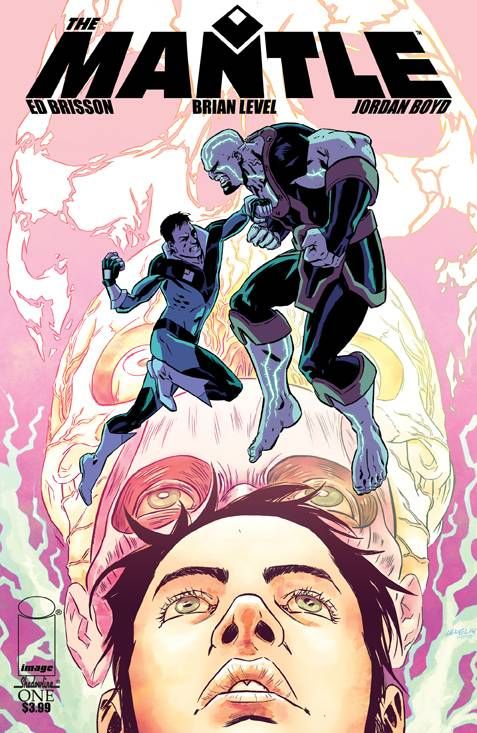"The Mantle" #1 by Ed Brisson and Brian Level toys with the superhero formula, but its sense of play isn't immediately apparent.
The exposition follows the normal turns: introduction of the two main characters, acquisition of powers and then the arrival of the explanation. The first fourth of the comic feels earnest, and the only tipoff that "The Mantle" might deviate from the norm is the cringeworthy dialogue. Robbie, the hero, talks like an annoying surfer dude. Jen, while less grating, doesn't have a whole lot of personality beyond her concern and tolerance of Robbie. The mentor figures all have off-putting attitudes, ranging from smugly knowledgeable to impatient. By the end of "The Mantle" #1, it's clear that some of this is deliberate, but the thin and negative characterization still blocks the reader from getting attached to any of the cast.
Level's facial expressions aren't strong enough to flesh out the heroes when the dialogue and action do not. It's the villain who gets the most sympathy points. The Plague has such sad and weary expression after the fight that some depth of character is suggested. The action is also easy to follow but, throughout most of the issue, the page and panel composition and energy level are just average. Level's anatomical proportions for the characters' bodies are exaggerated, but this works with Brisson's tone. Boyd's colors, on the other hand, feel like a mismatch. They are too cold and solemn, especially after the tone becomes less earnest and more mocking.
"The Mantle" #1 thus has to persuade the reader to get invested in the story purely on the strength of its humor and the last-page plot twist. The meta-jokes and fourth wall-breaking come off as trying too hard. Telling instead of showing doesn't get a free pass because the text is self-aware; it gets old fast. Brisson's dialogue relies too much on stock phrases like "time is of the essence" even while the rest of the dialogue makes fun of cookie-cutter origin stories. Robbie's clueless enthusiasm mixes poorly with Necra's better-than-thou sarcasm. The meta-references speak only to readers familiar with the stereotypes of the genre, and most of the jokes aren't funny enough to justify undermining the story's reality.
Brisson foreshadows heavily and the subversive final twist is easy to see coming. Despite this, the final page is still powerful because of the timing. Level also nails the pacing and composition for a sharp reveal. The final page is the strongest one.
By itself, the issue reads like offbeat satire and parody. Taken alone, it's a hero story that's making fun of hero stories. However, the marketing and promotion for the title -- including interviews with the creative team -- have played "The Mantle" up as a straightforward superhero comic with one key difference: the powers of the Mantle will pass to several heroes while the supporting team members remain.
A central hero or a team of characters, with a power set that evolves only gradually, is traditional because -- like most formulaic elements -- it's proven to work. A steady relationship between a hero and their power is the foundation to flesh out and illuminate the hero's character and the classic theme of how to handle new gifts and dangers. Eventually, the hero's powers are integrated into his or her identity. Kicking away that leg of the standard story table seems to be the main point of Brisson's pitch for "The Mantle." However, something needs to take its place. Story elements like plotting, dialogue and team dynamics need to level up in strength, or another compelling feature needs to be invented or retooled to make up the difference. The creative team also needs to reset the reader's expectations. Brisson and Level are only partially successful when measured by these factors, and so the reading experience is uneven. "The Mantle" doesn't find its groove or sink a hook in its debut issue.
Brisson has proven he can write a tight, twisty plot with previous books like "Sheltered." It's ambitious of him to experiment with the superhero formula. I'm curious to see how the characters, tone and structure will develop in the second issue, but "The Mantle" #1 is a shaky start. Further issues will make or break the title.

